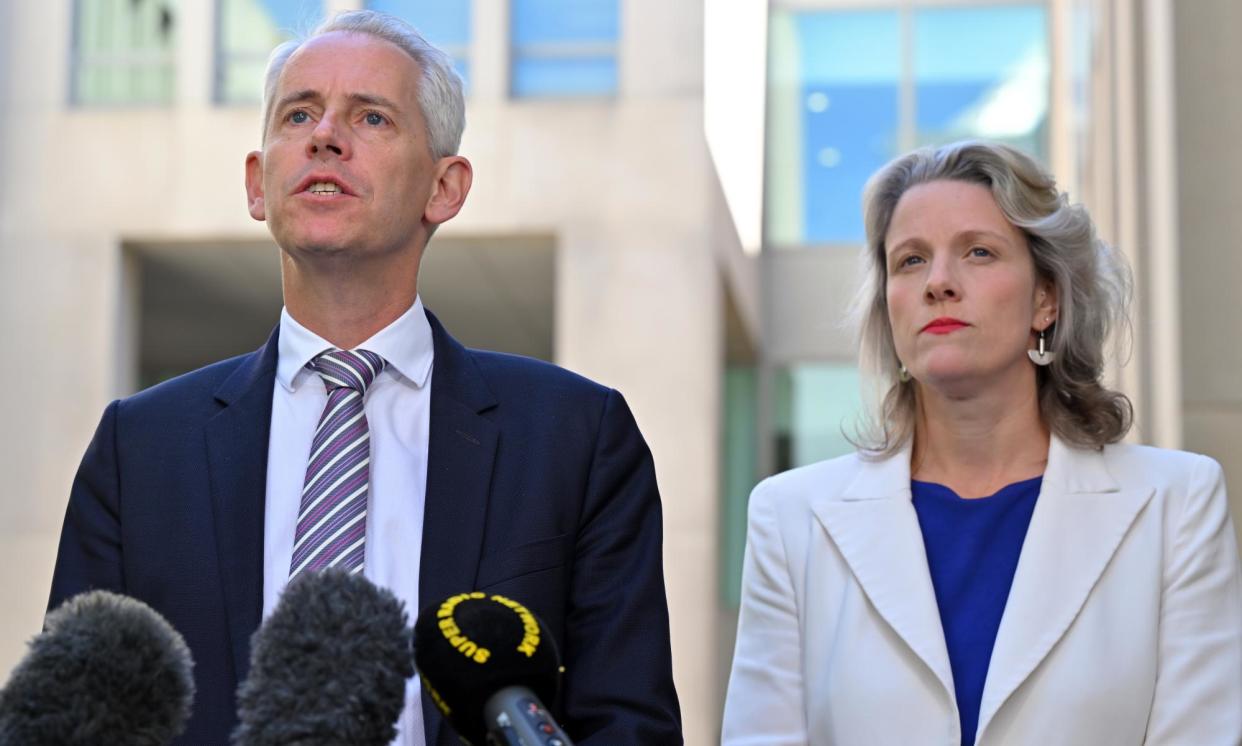Labor’s deportation bill could be used to blacklist entire countries’ citizens from obtaining visas to Australia

Entire countries could be blacklisted from obtaining visas to Australia under proposed legislation that has been described by migrant groups as “appalling” and by the Greens as a “Trump-style travel ban”.
The legislation – that will now be subject to a six-week Senate inquiry – could affect applicants from Russia, Iran, Iraq and South Sudan, as well as other countries unnamed by the government, that refuse to accept the forcible return of their nationals.
Refugees living in Australia and migrant community groups say the law could cut them off from their families and friends permanently.
“It’s appalling,” Betia Shakiba, an Iranian refugee and lawyer, said, “and a slap in the face”.
“This bill is a pure definition of discrimination. Australia prides itself on being a multicultural society and on being non-discriminatory, but this bill says the opposite.”
At a hastily organised Senate committee hearing on Tuesday night, secretary of the home affairs department, Stephanie Foster, was asked about further countries that could have travel bans imposed. She told the committee “I don’t have the list with me”, before amending her self-described “very loose wording” to say: “I do not have a list”.
The government wanted the Migration Amendment (Removal and Other Measures) Bill to be passed on Wednesday – after less than 36 hours of consideration by the parliament – but the Senate, instead, voted to send it off to a six-week Senate inquiry.
The legislation seeks to criminalise non-citizens in Australia refusing to cooperate with a forced return process (but excludes refugees being compelled to return to a country where they faced persecution).
The law would impose a mandatory jail sentence of one to five years and a possible fine in excess of $90,000 for non-citizens who refuse to cooperate with their forced removal from Australia, such as failing to attend an interview or providing certain documents.
But legal and migration experts say the details of the bill are far broader and give the government sweeping powers, including the ability to impose travel bans on all citizens from certain countries.
The bill creates an executive power for the government to designate any country as a “removal concern country” if it refused to accept its own nationals being returned from Australia, imposing an outright ban on any visa applications from any citizen of that country.
Migrant communities in Australia fear they could be cut off from friends and family.
“If this bill passes, this is going to permanently strip people of the right to reunite with their families,” Shakiba said, “this is not a fair bill”.
In the case of Australian-Iranians, “we are being discriminated against because of the regime running out of my former country”.
“We have to be distinguished from our regime, we have to be seen as contributing members of the Australian society that we are already a part of.”
The Greens spokesperson for immigration, Senator David Shoebridge, told the Senate hearing there was an obligation on the government to reveal which countries were “on the list” of potential proscribed countries, otherwise there were “millions of Australians who have family in other countries … thinking ‘is my family on the list’?”
He said later the legislation “effectively introduces a Trump-style travel ban”.
“This has not been the focus of a lot of media, but has been the focus for many in Australia with loved ones overseas. If the government ever uses these proposed powers it will separate families and undermine the multicultural Australia we are all proud of.”
Foster told Tuesday’s Senate hearing the legislation contained ministerial discretion to “lift the bar” for particular individuals, or entire classes of people, from proscribed countries to allow them to apply for a visa.
And Foster said the simple fact of the government having the power might act as a suasion on other countries, without ever having to use it.
“We very much see it as a diplomatic tool that will give us leverage in working with countries to try to make sure we have effective options to return people … not necessarily to have to put it into place,” she said.
She pointed out that the UK government has had a similar power for two years, but has not used it.
The bill’s explanatory memorandum said that designating a “removal concern country” would “slow down that entry pipeline into Australia and reduce growth in the cohort of potentially intractable removals over time”. But the senate hearing heard it could have the unintended consequence of driving people – unable to lawfully travel with a visa – to enter Australia by irregular means, such as by undeclared journey on a small boat.
There are also concerns the power could provoke retaliation from some of the countries targeted.
The US Congressional Research Service has previously considered “recalcitrant” countries and the use of visa sanctions, finding that some nations “may retaliate in ways detrimental to bilateral trade, tourism, law enforcement, or other forms of cooperation”.
The Kaldor Centre for International Refugee Law at the university of New South Wales said it was concerned by the proposal to blacklist entire countries.
“From a human-centred perspective, punishing people who may wish to work, study in or visit Australia for the actions of their government is punitive – particularly when the relevant countries are non-democratic autocracies.”


